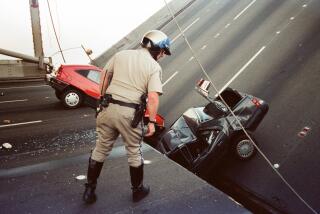Buffett Warns of Risk to Terror Insurers
- Share via
OMAHA — Warren Buffett, whose Berkshire Hathaway Inc. owns one of the world’s largest reinsurers, said Sunday that many insurance firms are running huge risks on the terrorism coverage they are selling, which could put them out of business.
“Many insurance companies are exposed to ruin” from policies including terrorism coverage, Buffett said the day after Berkshire Hathaway’s annual meeting. He predicted that there will be more terror attacks, possibly nuclear or biological, that would dwarf losses from Sept. 11.
“It’ll happen--in the next 10 minutes or the next 50 years,” said Buffett, who expects a nuclear or biological attack on the country at some point.
Buffett, whose reinsurance operations will pay out $2.4 billion of the overall $40 billion or so of losses from the destruction of the World Trade Center, renewed his call for the U.S. government to form a terror insurance program to help pay for future terror losses. He also called for insurance regulators to allow exclusions in policies for damage from nuclear attacks.
“It isn’t quantifiable,” Buffett said, describing the dangers of underwriting terror risks.
Despite that, Berkshire is providing some reinsurance coverage--which insurance companies buy to limit their losses--but said that all policies it takes on are strictly capped, so Berkshire knows the maximum it will have to pay out.
“We’re selling more terrorism coverage than anybody,” Buffett said, “but it does not endanger Berkshire Hathaway.”
Berkshire, which owns General Re, the world’s fourth-largest reinsurer, and specialized large risk underwriter National Indemnity, is in a better position than most to take on terror risk, as it has huge amounts of investments to cover claims, if necessary.
Buffett told shareholders at Berkshire’s annual meeting Saturday that his insurance and reinsurance operations had made a large profit in the first quarter, after a long period of difficulty.
He also warned that fraud and sloppy accounting were rife in American business and that returns on stock investing probably would be lower over the next few years than they have been.
“You’re going to see great results from our insurance businesses,” Buffett told an estimated 10,000 shareholders at Omaha’s Civic Auditorium Saturday. Berkshire, whose main business is insurance, had an operating loss last year as it was hammered by billions of dollars in Sept. 11 insurance claims. It is now making up the ground as premium rates soar.
“He was more optimistic than we expected,” Matt Sauer, a portfolio manager at Oak Value Capital Management, told Reuters.
But elsewhere, Buffett, 71, and his longtime partner Charlie Munger, 78, were less bullish on ways to make money, saying 6% to 7% was a fair return on investments in the current low-interest-rate environment.
“We have more money than ideas,” Buffett admitted, saying that finding good investments was not easy. Berkshire, which has grown to more than $110 billion in market value since Buffett took over in 1965, is always on the lookout for acquisitions.
“We wait for the fat pitch,” said Buffett, mentioning that he may be interested in buying firms in bankruptcy because of asbestos problems, but only if all liabilities had been dealt with. Buffett has said repeatedly that he needs a single $15-billion-or-so acquisition to keep Berkshire growing.
Asked about the apparent spread of corporate fraud in the light of recent meltdowns, Buffett said he and Munger had so far avoided being fooled, but he had seen plenty of frauds in public U.S. companies.
“Many of the crooks look like crooks,” Buffett said. “Wall Street loves them as long as they are pushing out securities.”
Looking out for those who use EBITDA numbers is a good start in spotting frauds, Buffett said, referring to a style of financial reporting made popular by loss-making Internet firms that discount interest, tax, depreciation, amortization and other one-time items from results. “They are either conning you or themselves,” he said.
Several Berkshire shareholders, from as far away as Hong Kong and South Africa, quizzed Buffett on his investing technique.
“There is no single metric I can give you that tells you now is a good time to buy stocks,” Buffett told one shareholder, who asked what calculations he should make to evaluate stocks. “People always want a formula; it doesn’t work that way.”
The only way to value a stock, or a company, he said, is to estimate what cash a business will throw off over the course of its life, work out the value of that cash now, and buy it for less. “A great IQ is not needed to do well as an investor,” Buffett said. What is needed is the “ability to detach yourself from the crowd.”
More to Read
Inside the business of entertainment
The Wide Shot brings you news, analysis and insights on everything from streaming wars to production — and what it all means for the future.
You may occasionally receive promotional content from the Los Angeles Times.








